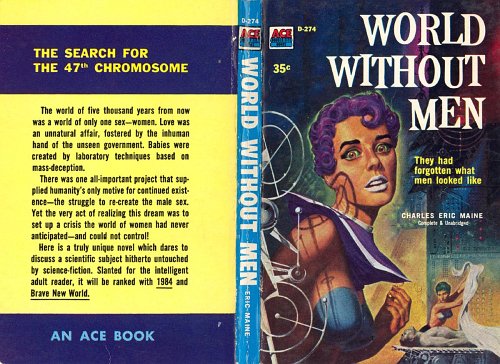
Charles Eric Maine’s Novel of Lesbian Dystopia
By Thomas F. Bertonneau
[Note: Another article by Bertonneau on World Without Men appeared this week in The Brussels Journal. The essay below was written for readers of The Thinking Housewife.]
BY WAY OF INTRODUCING both my topic and myself I might say that I am a lifelong aficionado of science fiction who is familiar with the genre in depth. When I teach my course on science fiction at SUNY Oswego, I concentrate of classics texts of high literary merit – those by Edgar Allan Poe, H. G. Wells, Olaf Stapledon, and Ray Bradbury. When I pursue my hobby I am less selective. When I discover an unknown paperback title in a second hand bookshop, I frankly judge the item by its cover and where content is concerned I hope for the best. Most of the mouldering paperbacks fall short of memorability. Occasionally, however, I stumble across a jewel among the rubble, a short story or novel more or less forgotten that, for one reason or another, merits contemporary re-visitation. One such, which I encountered again recently after a lapse of decades, is Charles Eric Maine’s World Without Men (1958)**, a novel about the long-term implications of birth control, abortion, and the so-called sexual revolution that treats these matters in a bold and prescient way.
It is safe to say that World Without Men could not be published today. Editors, evaluating it in manuscript, would deem it absolutely politically incorrect; they would act to prevent Maine from perpetrating the lese majesté inherent in a story that unstintingly defends the idea of a natural order of human existence and which, describing homosexuality without embarrassment as “perversion,” argues that feminism (inherently homosexual in Maine’s view) is a totalitarian ideology. Better to suppress such a thing.
In World Without Men,Maine tells a story in five quasi-independent but serially related episodes, unfolding a chronology that begins late in his own Twentieth Century and culminates fivethousand years from now in the year 7000 AD. The first and fifth stories take place in 7000 AD; the setting and a recurrent point-of-view character unify them. The second, third, and fourth stories fill in the chronological gaps, the second taking place (as one might suppose) before the advent of the Second Millennium, the third taking place fifty or seventy-five years after the second, and the fourth taking place perhaps two millenniabefore the first and the fifth (around 3000 AD). The five episodes are (1) “The Man,” (2) “The Monkey,” (3) “The Girl,” (4) “The Patriarch,” and (5) “The Child.” It seems logical to discuss “The Monkey” first, since this story represents the cause in response to which the other stories represent the consequences. World Without Men is a novel about the liquidation of the male sex.
(more…)

![bigstockphoto_Black_Flowers_4800530[1] bigstockphoto_Black_Flowers_4800530[1]](https://thinkinghousewife.com/wp/wp-content/uploads/2010/08/bigstockphoto_Black_Flowers_480053011-150x105.jpg)
![bigstockphoto_Red_flower_6588759[1] bigstockphoto_Red_flower_6588759[1]](https://thinkinghousewife.com/wp/wp-content/uploads/2010/08/bigstockphoto_Red_flower_65887591-150x124.jpg)


